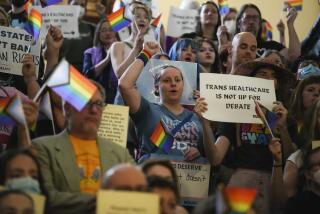Op-Ed: Giving people a license to discriminate because of their religious beliefs

- Share via
Under long-standing constitutional law, religious beliefs do not provide an exemption from civil rights laws and cannot be used as an excuse for discrimination.
Yet the Supreme Court on Thursday in Fulton vs. City of Philadelphia ruled in favor of the ability of Catholic Social Services to participate in the city’s foster care program even though that organization discriminates based on sexual orientation. Although the grounds for the court’s unanimous ruling were narrow, the implications are broad and indicate a court that is inclined to allow discrimination based on religious beliefs.
The Fulton case involves the city’s decision to refuse to contract with organizations that engage in forbidden discrimination. Philadelphia routinely contracts with private social service agencies to help place children in foster homes. Those agencies are “delegated” the power of the government in determining whether individuals satisfy state requirements for becoming foster parents. Every contract is explicit in prohibiting these agencies from discriminating on the basis of race, sex, religion and sexual orientation.
Catholic Social Services has long participated in this program, but in recent years has declined to do so because of the contractual requirement that it not discriminate based on sexual orientation. It says that its religious beliefs prevent it from providing inspections of same-sex couples or placing children with those couples.
The organization challenged the nondiscrimination requirement as violating its 1st Amendment rights. The federal district court and the United States Court of Appeals for the 3rd Circuit rejected these arguments, but the Supreme Court reversed those decisions and ruled in the agency’s favor.
In 1990, the court in Employment Division vs. Smith ruled that free exercise of religion does not provide an exemption from a generally applied law. In that case, the court rejected a claim by Native Americans — based on their religious beliefs — for an exemption from a state law prohibiting use of peyote. But the court also said that laws cannot discriminate against religion.
Chief Justice John G. Roberts Jr., writing in the Fulton case, said that the Philadelphia law allowed for exceptions and this discretion meant it was not a sufficiently general law. The possibility of discrimination in exercising this discretion, he wrote, made Philadelphia’s requirement a violation of the free exercise of religion.
But there was no evidence that Philadelphia actually treated Catholic Social Services differently from other social service agencies or used its discretion in an impermissible way. And it is interesting that even the liberal justices — Stephen G. Breyer, Sonia Sotomayor and Elena Kagan — did not raise this point. Perhaps they were glad to go along with a narrow ruling rather than risk one that changed the law and opened the door even more to discrimination based on religious beliefs.
I fear that this decision is part of a trend toward expanding the protection of free exercise of religion at the expense of other crucial government interests. Earlier this year, the court found that California violated free exercise of religion when it limited the size of religious gatherings in homes, even though secular gatherings of the same size were restricted.
A few years ago, there was a case about a baker who, because of his religious beliefs, refused to design a cake for a same-sex couple. In 2018, the court ruled in favor of the baker, though again on narrow grounds. There are many cases pending that raise the same issue involving florists, photographers and stationery stores, which refuse to serve same-sex couples on account of the business owner’s religious beliefs. A year ago, the court held that Title VII of the 1964 Civil Rights Act protects workers against discrimination based on sexual orientation or gender identity. Many employers are now suing and claiming a religion-based right to discriminate against LGBTQ individuals.
The underlying issue is one of profound importance. There is inherently a tension between liberty and equality. Any law that prohibits discrimination limits the freedom to discriminate. For over a half-century, the Supreme Court has found stopping discrimination to be more important than protecting a right to discriminate. In fact, in Newman vs. Piggie Park Enterprises in 1968, the court described as “patently frivolous” a challenge to the 1964 Civil Rights Act, which prohibits race discrimination by places of public accommodation, on the ground that it interferes with the “free exercise of the Defendant’s religion.”
At the oral argument in Fulton, Breyer and Kagan asked whether Philadelphia could refuse to contract with a social services agency that refused to place children with interracial couples because of its religious beliefs. The lawyer for Catholic Social Services immediately said the city could refuse to contract because that involved race discrimination, whereas this case concerns sexual orientation discrimination. But there is no basis for this distinction: There is a compelling government interest in stopping both forms of discrimination.
Although Thursday’s decision breaks no new legal ground, it again shows the court protecting religious freedom even when it imposes harm on others. This could signal a dangerous, broader movement on the court to give license to discrimination, based on religious beliefs, especially against gays, lesbians and transgender people.
Erwin Chemerinsky is dean of the UC Berkeley School of Law and a contributing writer to Opinion. He is the author of a forthcoming book, “Presumed Guilty: How the Supreme Court Empowered the Police and Subverted Civil Rights.”
More to Read
A cure for the common opinion
Get thought-provoking perspectives with our weekly newsletter.
You may occasionally receive promotional content from the Los Angeles Times.










